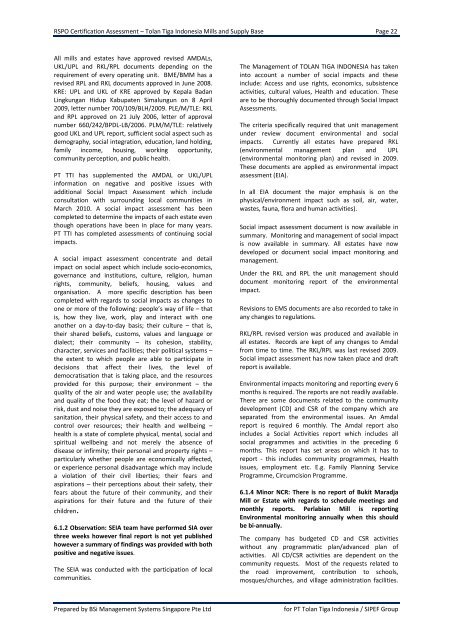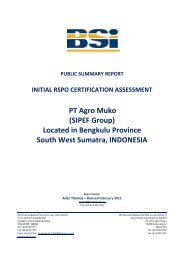PT Tolan Tiga Indonesia (SIPEF Group) Sumatra, INDONESIA
PT Tolan Tiga Indonesia (SIPEF Group) Sumatra, INDONESIA
PT Tolan Tiga Indonesia (SIPEF Group) Sumatra, INDONESIA
Create successful ePaper yourself
Turn your PDF publications into a flip-book with our unique Google optimized e-Paper software.
RSPO Certification Assessment – <strong>Tolan</strong> <strong>Tiga</strong> <strong>Indonesia</strong> Mills and Supply Base Page 22<br />
All mills and estates have approved revised AMDALs,<br />
UKL/UPL and RKL/RPL documents depending on the<br />
requirement of every operating unit. BME/BMM has a<br />
revised RPL and RKL documents approved in June 2008.<br />
KRE: UPL and UKL of KRE approved by Kepala Badan<br />
Lingkungan Hidup Kabupaten Simalungun on 8 April<br />
2009, letter number 700/109/BLH/2009. PLE/M/TLE: RKL<br />
and RPL approved on 21 July 2006, letter of approval<br />
number 660/242/BPDL-LB/2006. PLM/M/TLE: relatively<br />
good UKL and UPL report, sufficient social aspect such as<br />
demography, social integration, education, land holding,<br />
family income, housing, working opportunity,<br />
community perception, and public health.<br />
<strong>PT</strong> TTI has supplemented the AMDAL or UKL/UPL<br />
information on negative and positive issues with<br />
additional Social Impact Assessment which include<br />
consultation with surrounding local communities in<br />
March 2010. A social impact assessment has been<br />
completed to determine the impacts of each estate even<br />
though operations have been in place for many years.<br />
<strong>PT</strong> TTI has completed assessments of continuing social<br />
impacts.<br />
A social impact assessment concentrate and detail<br />
impact on social aspect which include socio-economics,<br />
governance and institutions, culture, religion, human<br />
rights, community, beliefs, housing, values and<br />
organisation. A more specific description has been<br />
completed with regards to social impacts as changes to<br />
one or more of the following: people’s way of life – that<br />
is, how they live, work, play and interact with one<br />
another on a day-to-day basis; their culture – that is,<br />
their shared beliefs, customs, values and language or<br />
dialect; their community – its cohesion, stability,<br />
character, services and facilities; their political systems –<br />
the extent to which people are able to participate in<br />
decisions that affect their lives, the level of<br />
democratisation that is taking place, and the resources<br />
provided for this purpose; their environment – the<br />
quality of the air and water people use; the availability<br />
and quality of the food they eat; the level of hazard or<br />
risk, dust and noise they are exposed to; the adequacy of<br />
sanitation, their physical safety, and their access to and<br />
control over resources; their health and wellbeing –<br />
health is a state of complete physical, mental, social and<br />
spiritual wellbeing and not merely the absence of<br />
disease or infirmity; their personal and property rights –<br />
particularly whether people are economically affected,<br />
or experience personal disadvantage which may include<br />
a violation of their civil liberties; their fears and<br />
aspirations – their perceptions about their safety, their<br />
fears about the future of their community, and their<br />
aspirations for their future and the future of their<br />
children.<br />
6.1.2 Observation: SEIA team have performed SIA over<br />
three weeks however final report is not yet published<br />
however a summary of findings was provided with both<br />
positive and negative issues.<br />
The SEIA was conducted with the participation of local<br />
communities.<br />
The Management of TOLAN TIGA <strong>INDONESIA</strong> has taken<br />
into account a number of social impacts and these<br />
include: Access and use rights, economics, subsistence<br />
activities, cultural values, Health and education. These<br />
are to be thoroughly documented through Social Impact<br />
Assessments.<br />
The criteria specifically required that unit management<br />
under review document environmental and social<br />
impacts. Currently all estates have prepared RKL<br />
(environmental management plan and UPL<br />
(environmental monitoring plan) and revised in 2009.<br />
These documents are applied as environmental impact<br />
assessment (EIA).<br />
In all EIA document the major emphasis is on the<br />
physical/environment impact such as soil, air, water,<br />
wastes, fauna, flora and human activities).<br />
Social impact assessment document is now available in<br />
summary. Monitoring and management of social impact<br />
is now available in summary. All estates have now<br />
developed or document social impact monitoring and<br />
management.<br />
Under the RKL and RPL the unit management should<br />
document monitoring report of the environmental<br />
impact.<br />
Revisions to EMS documents are also recorded to take in<br />
any changes to regulations.<br />
RKL/RPL revised version was produced and available in<br />
all estates. Records are kept of any changes to Amdal<br />
from time to time. The RKL/RPL was last revised 2009.<br />
Social impact assessment has now taken place and draft<br />
report is available.<br />
Environmental impacts monitoring and reporting every 6<br />
months is required. The reports are not readily available.<br />
There are some documents related to the community<br />
development (CD) and CSR of the company which are<br />
separated from the environmental issues. An Amdal<br />
report is required 6 monthly. The Amdal report also<br />
includes a Social Activities report which includes all<br />
social programmes and activities in the preceding 6<br />
months. This report has set areas on which it has to<br />
report - this includes community programmes, Health<br />
issues, employment etc. E.g. Family Planning Service<br />
Programme, Circumcision Programme.<br />
6.1.4 Minor NCR: There is no report of Bukit Maradja<br />
Mill or Estate with regards to schedule meetings and<br />
monthly reports. Perlabian Mill is reporting<br />
Environmental monitoring annually when this should<br />
be bi-annually.<br />
The company has budgeted CD and CSR activities<br />
without any programmatic plan/advanced plan of<br />
activities. All CD/CSR activities are dependent on the<br />
community requests. Most of the requests related to<br />
the road improvement, contribution to schools,<br />
mosques/churches, and village administration facilities.<br />
Prepared by BSi Management Systems Singapore Pte Ltd for <strong>PT</strong> <strong>Tolan</strong> <strong>Tiga</strong> <strong>Indonesia</strong> / <strong>SIPEF</strong> <strong>Group</strong>




